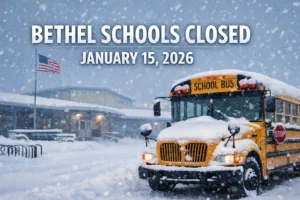Financial planning in Bethel requires looking beyond conventional advice and tailoring strategies to fit the town’s distinct lifestyle. With limited retail options, for example, many residents rely heavily on bulk purchases and seasonal shipments to reduce costs. This approach can be efficient but requires upfront financial discipline and careful planning. Creating a comprehensive budget and sticking to it is essential, especially when grocery bills, energy expenses, and other basics can spike without warning.
Another consideration for Bethel residents is transportation. Unlike many urban areas with easily accessible public transit, residents often rely on small planes, boats, or snowmobiles for travel. This adds a layer of expense and unpredictability to mobility. For many, it’s vital to have a fund specifically for travel emergencies or medical flights—an aspect that isn’t always part of financial planning for those in other regions.
Understanding Bethel’s Cost of Living

Bethel’s cost of living stands out for being significantly higher than the national average, largely due to its remote location.
Transportation costs are one of the main contributors to this financial burden. Since most goods must be flown or shipped in, prices for food, household essentials, and construction materials can soar.
Even everyday items, which might be inexpensive elsewhere, can come at a premium. As a result, residents need to prioritize budgeting and finding cost-effective ways to meet their needs.
High Cost of Goods and Transportation
In Bethel, one of the most significant challenges residents face is the high cost of goods, primarily driven by transportation expenses.
Since Bethel is not connected to the state highway system and relies on air and barge transport, the cost of bringing in groceries, building supplies, fuel, and other essentials is far higher than in more accessible areas.
This increase is passed on to consumers, resulting in everyday items often being priced at two to three times the cost found in urban centers. Residents need to be strategic in their purchases, often buying in bulk or planning during sales or bulk delivery opportunities to offset these expenses.
Availability of Essential Services and Their Impact on Budgets
Essential services in Bethel, such as healthcare, education, and utilities, come with their own unique availability challenges and cost considerations.
Healthcare access, for example, may involve long wait times or travel to other cities for specialized care, which can lead to unplanned expenses.
Utility costs are also higher due to reliance on diesel for power, making energy conservation critical for budget management. The limited number of service providers can drive up prices and reduce competition, impacting household budgets.
As a result, a financial management plan often includes careful management of these essential costs and exploring community-based solutions or subsidies.
Seasonal Cost Fluctuations and Their Financial Impact
During the harsh winter months, residents see an increase in heating bills, transportation challenges due to snow or ice, and higher food costs, especially for fresh produce. Stocking up on essential supplies in advance of winter or during sales is a common strategy to manage these fluctuations.
Conversely, during the summer months, when barge access resumes and some transportation costs decrease, it becomes an opportunity to replenish and prepare. Also, 40% of Americans cannot cover a $400 emergency expense, which raises concerns about financial resilience.
Effective budgeting requires anticipating and preparing for these predictable shifts in costs, ensuring households are ready for whatever the season brings.
Tips for Saving Money

1- Buying in Bulk and Using Local Co-ops or Community Resources
One of the most effective ways to save money in Bethel is by purchasing goods in bulk. Bulk buying often reduces the cost per unit and minimizes the need for frequent, expensive trips to restock essentials.
Local co-ops or community buying groups can be invaluable resources, allowing residents to pool their orders to save on shipping costs and benefit from lower bulk prices. By participating in these initiatives, residents can stretch their money planning further and access items that may otherwise be prohibitively expensive.
2- Planning Grocery Shopping to Minimize Costs and Waste
A careful money management plan before heading to the store can lead to significant savings. Creating a shopping list based on meals for the week helps prevent impulse buys and ensures that every purchase is necessary.
Focusing on non-perishable and versatile food items that can be used in multiple dishes can also help reduce waste. Additionally, keeping an eye out for sales, discounts, and loyalty programs at local stores can further reduce grocery costs over time. Proper storage and portion control can also minimize food waste, stretching dollars even further.
3- Energy-Saving Tips for Harsh Winters (Heating, Fuel, etc.)
With harsh winters in Bethel, heating and fuel costs can quickly become one of the largest household expenses. Insulating homes, sealing windows and doors to prevent drafts, and using programmable thermostats to regulate heating are practical steps that can significantly reduce energy consumption.
Consider dressing in layers and using blankets instead of raising the thermostat to conserve energy. Regularly maintaining heating systems and ensuring they operate efficiently can also lower costs.
Residents can further explore using energy-efficient appliances or even collaborating with local programs aimed at providing support for winterizing homes.
4- Exploring Local Produce and Subsistence Activities (Hunting, Fishing, Foraging)
Bethel’s remote location and unique environment offer opportunities for residents to engage in subsistence activities. Hunting, fishing, and foraging for local produce can provide nutritious and cost-effective food sources while reducing dependency on expensive imported goods.
Traditional practices like berry picking or fishing for salmon not only support food security but also connect residents with their cultural heritage. Participating in community subsistence initiatives can build stronger networks and reduce overall food costs for many families.
Extra Tip: In tight-knit communities like Bethel, bartering or trading goods and services with neighbors is a practical way to save money. By exchanging skills, such as carpentry work for vehicle maintenance or trading homemade goods, residents can access resources without spending money. This approach builds community resilience and creates mutually beneficial relationships, helping everyone save money and make the most of limited resources.
Final Words
Taking control of financial planning and management is both challenging and rewarding, offering a path to greater stability and security in a unique living environment.
By buying in bulk, utilizing community co-ops, planning grocery trips to minimize waste, practicing energy conservation during harsh winters, and exploring subsistence activities like hunting and foraging, residents can stretch their budgets effectively.
The key is to stay proactive, continuously improving budgeting strategies, and making full use of local resources.
Embracing these financial habits not only reduces costs but fosters a resilient, connected community. Start today, and take charge of your financial future with thoughtful planning and creative solutions.












